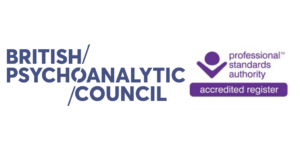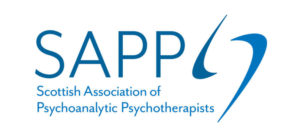The Scottish Association of Psychoanalytic Psychotherapists is a professional organisation based in Edinburgh, providing training in psychoanalytical psychotherapy. A member organisation of the British Psychoanalytic Council, it provides a range of ongoing CPD events for its membership and access to therapeutic services for members of the public.

Psychoanalytic Psychotherapy for Adults
What is Psychoanalytic Psychotherapy?
Psychoanalytic psychotherapy is a talking therapy based on Freud’s theories and methods of psychoanalysis. These were later developed by well- known theorists such as Melanie Klein, Ronald Fairbairn and Donald Winnicott who were all interested in how the mind works. With other contemporary practitioners, this body of work remains current and relevant to our times.
What does it offer?
Psychoanalytic psychotherapy offers opportunities to explore the assumptions, attitudes and underlying conflicts, both conscious and unconscious, that affect our lives in general and our personal relationships in particular. It is when such conflicts remain unresolved and are repeated and re-enacted that they can give rise to emotional distress, creating everyday problems with loving relationships and our working lives.
How does it work?
Talking therapies become effective through the development of a professional trusting relationship between a person and their psychotherapist. In the course of creating this relationship, both conscious and unconscious aspects of a person’s difficulties are brought to life. This makes it possible for someone to use the therapeutic relationship with the psychotherapist to explore and work together on what is most troubling. Insights gained in this way can help bring about change in behaviours and personality and in the severity of symptoms.
How long does it take?
From this it can be seen that psychoanalytic psychotherapy requires time and frequency of sessions to unfold. Because each person is unique in the time they need to come to a sense of resolution, ideally, the commitment to meet is open-ended. It may prove to be long-term, but brief therapy (6 to 20 sessions) is also possible and even desirable, for those whose general stability has been recently upset by a major life event such as birth, divorce, or bereavement. Sessions, lasting 50 minutes, would normally be at least weekly. Depending on the level and type of distress, it may prove helpful to meet more frequently.
Where does psychotherapy take place and how does it start?
In Scotland, psychotherapists work independently in private premises, in some voluntary organisations and within some NHS departments of psychotherapy. Referral to a psychoanalytic psychotherapist working privately can be made by the person themselves direct to the therapist. Voluntary organisations have a contact point of referral and NHS referrals are made through a person’s General Practitioner. Usually a psychotherapist will offer an initial meeting or short series of meetings when the nature of the person’s immediate concerns can be discussed and any recommendations about further therapy be thought about. If further work is agreed, questions about the frequency and the likely time-span of the therapy can be discussed.
Who can benefit?
The most important positive indication for psychotherapy is the wish to explore the meaning of a persistent concern or unhappiness.
The main contra-indications (especially where in-patient facilities are not readily available) are active psychotic illness, addiction, or repeated suicide attempts.
What does it cost?
Psychoanalytic psychotherapy taking place in the NHS is normally free. In private or voluntary sector practice costs are agreed following negotiation between the person seeking help and the psychotherapist.
What safeguards does the patient have?
All psychoanalytic psychotherapists have undergone a rigorous training which includes intensive, personal psychoanalysis. All qualified psychoanalytic psychotherapists, who are members of the Scottish Association of Psychoanalytic Psychotherapists, are registered through the British Psychoanalytic Council and governed by the ethical code of that organization.
Post qualification, they are expected to undertake continuing professional development, to be legally insured, and to receive professional supervision for their work.
If you are interested in what the psychoanalytic approach to psychotherapy involves, University College London has provided a useful description of what people can expect from a therapist if they are offered a psychoanalytic/psychodynamic intervention.
Click here to read the article.

